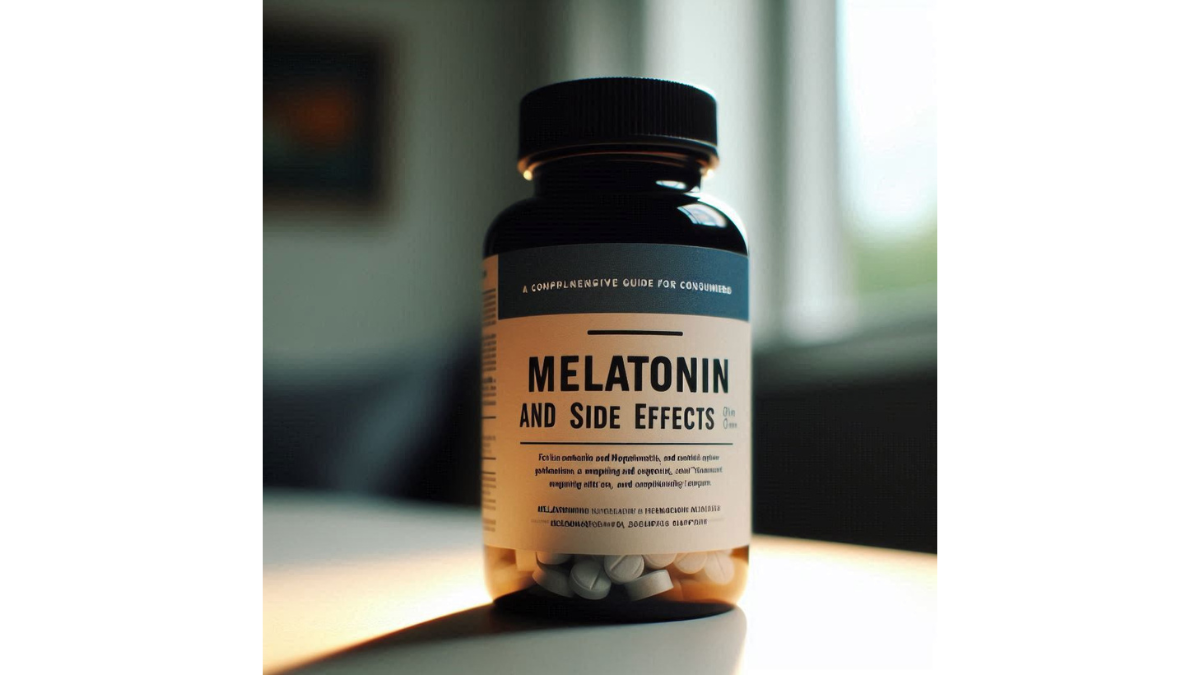Melatonin and Side Effects: A Comprehensive Guide

Melatonin and Side Effects: A Comprehensive Guide – Melatonin is a hormone that your body naturally produces, primarily in response to darkness. Often referred to as the “sleep hormone,” it plays a crucial role in regulating your sleep-wake cycle, known as the circadian rhythm. You might be surprised to learn that melatonin is not just for sleeping; it also influences various bodily functions, from enhancing immune response to regulating mood. When the sun sets and darkness falls, your brain’s pineal gland kicks into gear and starts producing melatonin. This biological clock helps signal your body that it’s time to wind down and prepare for sleep. You could think of melatonin as your body’s own internal clock, quietly ensuring that you get the rest you need.
How Does Melatonin Work?
So, how exactly does melatonin do its job? Imagine it as a soothing friend that gently nudges you towards sleep. Here’s how the process unfolds:
- Light Sensitivity: Melatonin production is highly sensitive to light. During the day, when you are exposed to natural light, production is inhibited. It tends to peak in the evening, signaling your body to prepare for sleep.
- Receptor Activation: Once in your bloodstream, melatonin binds to receptors in your brain and body, promoting drowsiness and reducing alertness.
- Circadian Rhythm Regulation: By helping to synchronize your internal clock, melatonin influences sleep patterns — ensuring you fall asleep faster and enjoy deeper sleep.
Let’s say you’re traveling to a different time zone. You may notice that you struggle to adapt. Melatonin can be a helpful tool in this situation, easing your transition by mimicking natural night-time signals. In essence, melatonin serves as a natural balance to our often chaotic schedules, helping you achieve timely and restful sleep. By understanding what melatonin is and how it works, you can make informed decisions about its use and benefits for your well-being.
Benefits of Melatonin
Improving Sleep Quality
Now that you have an understanding of what melatonin is and how it works, let’s dive into its numerous benefits, starting with sleep quality. Many people are discovering the remarkable impact that melatonin can have on enhancing their sleep experience. Imagine the relief of waking up refreshed instead of dragging yourself out of bed. Melatonin supplements can help in several ways:
- Faster Sleep Onset: Research suggests that melatonin can significantly reduce the time it takes to fall asleep. In a world filled with distractions and stress, this can be a game-changer for many seeking that elusive good night’s rest.
- Reduced Nighttime Awakenings: By promoting more stable sleep cycles, melatonin can decrease the frequency with which you wake up during the night, leading to a more uninterrupted and restorative sleep.
- Improved Sleep Duration: Those who supplement with melatonin often report not only falling asleep more quickly but also sleeping longer. It’s like giving your body a gentle push to enjoy the fullness of restorative slumber.
Imagine this: You’ve just come off a long day filled with meetings and deadlines, and your mind is racing. After taking melatonin, you find that your mind calms down, and you drift off to sleep effortlessly.
Managing Jet Lag
Traveling can disrupt your sleep schedule and lead to the dreaded jet lag. If you’ve ever taken an international flight and found yourself wide awake at 3 AM in a new time zone, you’re not alone. Fortunately, melatonin can come to the rescue here, too! Here’s how melatonin helps in managing jet lag:
- Resets Your Internal Clock: Melatonin can help your body adjust to new time zones by mimicking the natural hormonal changes that occur with sunset and sunrise.
- Shortens Adjustment Time: Research indicates that taking melatonin before bedtime at your destination could reduce the time it takes for your body to adapt to local time.
- Improved Alertness: By easing the transition, melatonin may help you feel more alert and focused, allowing you to enjoy your travels without the groggy fog of jet lag.
Picture this: You arrive in Paris, and instead of battling fatigue, you take a melatonin supplement. You quickly drift off to sleep and wake up ready to explore the City of Lights. In conclusion, melatonin is not just about sleep; it enhances the quality of your rest and can make travel smoother by managing jet lag. With its growing popularity, understanding these benefits can empower you to make informed choices for your health and well-being.
Side Effects of Melatonin
Common Side Effects
As with any supplement, it’s essential to be aware of potential side effects, especially when using melatonin to enhance sleep or manage jet lag. While many individuals enjoy its benefits without issue, others might experience some common side effects. Here are a few symptoms you might encounter:
- Drowsiness: This may seem like a no-brainer, but while melatonin is meant to help you sleep, it can sometimes lead to excessive drowsiness the next day, making it harder to be alert.
- Headaches: Some users report experiencing mild headaches after taking melatonin. This could be due to individual sensitivity to the supplement.
- Dizziness: Feeling a bit lightheaded? Some people may experience dizziness, particularly if they take a dose that’s too high.
- Nausea: Although less common, some individuals report feeling slightly queasy after taking melatonin, especially if consumed on an empty stomach.
In my own experience, I found that after starting melatonin, I felt a bit groggy the next morning until I adjusted my dosing schedule. It was a minor tweak that made a big difference!
Rare Side Effects
While the common side effects are typically mild, there are some rare side effects that warrant attention. Although these are not as frequently reported, being informed can help you make better decisions.
- Mood Changes: A small number of users have reported feelings of depression or anxiety. If you notice any sudden shifts in your mood after starting melatonin, it’s worth discussing with a healthcare professional.
- Sleep Disturbances: Ironically, while melatonin is designed to improve sleep quality, some people may experience vivid dreams or even nightmares. This unexpected change in sleep patterns can be unsettling.
- Hormonal Effects: Since melatonin is a hormone, it can potentially affect your reproductive hormones, leading to irregular menstrual cycles in women or changes in libido in men.
Despite these rare side effects, many find that the benefits of melatonin greatly outweigh the negatives. That said, being aware of what might occur can empower you to use melatonin safely and effectively. Always consult your healthcare provider if you have concerns or experience any troubling side effects.
Factors to Consider Before Taking Melatonin
Interactions with Medications
As you contemplate taking melatonin, it’s crucial to consider the potential interactions it may have with other medications you might be using. This is particularly important, as combining certain drugs with melatonin can lead to unexpected side effects or reduced effectiveness of your medications. Here’s a quick overview of some categories of medications that may interact with melatonin:
- Sedatives and Sleep Aids: Taking melatonin in conjunction with other sedatives can potentially enhance drowsiness, which may lead to excessive sedation. Always consult your doctor to avoid any dangerous combinations.
- Antidepressants: Some antidepressants can cause changes in serotonin levels, which might interact with melatonin. If you’re on these medications, it’s advisable to discuss your melatonin usage with your healthcare provider.
- Blood Thinners: Melatonin can affect blood clotting. If you’re on anticoagulants like warfarin, need to be cautious about introducing melatonin into your routine.
- Immunosuppressants: If you’re taking medications that suppress your immune system, melatonin could potentially interfere with their effects.
When I first considered taking melatonin, I had recently started an antidepressant, and discussing it with my physician clarified any potential interactions, allowing me to feel safe about my choices.
Proper Dosage Guidelines
Another critical factor to keep in mind is the proper dosage of melatonin. Unlike many supplements, melatonin doesn’t have a one-size-fits-all approach. Here are some general guidelines to help you navigate the ideal dosage:
- Start Low: It’s often recommended to start with a low dose, typically between 0.5 to 3 milligrams. This allows you to gauge how your body responds.
- Timing Matters: Taking melatonin 30 to 60 minutes before your desired bedtime can help it work effectively.
- Increase Gradually: If you find that the lower dose isn’t yielding the results you want, you can gradually increase it, but it’s a good idea not to exceed 5 to 10 milligrams unless directed by a healthcare provider.
- Short-Term Use: Melatonin may be particularly effective for short-term sleep issues or adjustments, such as jet lag. Using it continuously over extended periods should be done under supervision.
In conclusion, understanding potential interactions and adhering to proper dosage guidelines can maximize the benefits of melatonin while minimizing risks. This preparatory work allows you to confidently navigate your sleep improvement journey! Always feel empowered to seek professional advice tailored to your unique health situation.
Safety and Precautions of Melatonin Use
Use in Children
When it comes to melatonin, one of the most debated topics is its use in children. While it’s common for parents to look for solutions to help their kids sleep better, it’s essential to approach melatonin with caution. Many studies suggest that melatonin can effectively help children with sleep difficulties, particularly for those with conditions like ADHD or autism. However, there are a few key considerations to keep in mind:
- Consult with a Pediatrician: Before giving melatonin to a child, it’s crucial to discuss it with their healthcare provider. The doctor can evaluate your child’s specific situation and recommend the best approach.
- Dosage: If prescribed, melatonin dosages for children typically range from 0.5 to 3 milligrams. Always follow the guidance of your healthcare provider regarding the appropriate dosage.
- Short-Term Use: Melatonin is generally considered safe for short-term use in children. Using it long-term, however, should only be done under the guidance of a healthcare professional due to the potential effects on hormonal development.
As a parent myself, I once faced the challenge of my child having difficulty falling asleep. After consulting with our pediatrician, we chose to try a low dose of melatonin, and it helped improve their sleep routine without any noticeable side effects.
Use in Pregnancy and Breastfeeding
Next, let’s talk about melatonin use during pregnancy and breastfeeding. This is another area that requires careful consideration due to limited research on its safety in these circumstances.
- Pregnancy: While melatonin is a naturally occurring hormone, taking it as a supplement during pregnancy is not widely recommended unless prescribed by a healthcare provider. Some studies have raised concerns about potential pregnancy complications or effects on fetal development.
- Breastfeeding: Similar to pregnancy, the effects of melatonin on breastfeeding infants are not well-studied. Some researchers suggest it may pass into breast milk, impacting the infant’s sleep patterns or hormonal balance.
If you are pregnant or nursing and considering melatonin, prioritize an open conversation with your healthcare provider. They can help you weigh the potential benefits against any risks. In conclusion, while melatonin can offer benefits for sleep issues, careful consideration is vital when it comes to its use in children, during pregnancy, and while breastfeeding. By approaching melatonin thoughtfully and seeking professional advice, you can make informed choices that prioritize safety for you and your loved ones.
Long-Term Effects of Melatonin
Impact on Hormone Production
As you consider using melatonin to improve your sleep, it’s important to reflect on its long-term effects, particularly concerning hormone production. Melatonin is not just a sleep aid; it’s a hormone that plays an intricate role in regulating various bodily functions. Here’s what to keep in mind regarding its impact on hormones:
- Circadian Rhythm Regulation: Melatonin helps maintain your body’s internal clock, influencing sleep-wake cycles and various hormonal releases. Prolonged melatonin use may alter your body’s natural rhythms, affecting how your body produces other hormones like cortisol, estrogen, and testosterone.
- Puberty and Development: For children and teenagers, extended melatonin use can potentially affect the timing of puberty. Hormonal disruptions during crucial developmental periods may lead to unexpected health implications.
- Thyroid Function: Some studies suggest that melatonin may influence thyroid hormone production. If you have thyroid issues or are on thyroid medication, it’s worth discussing melatonin’s use with your healthcare provider to ensure there won’t be any unintended consequences.
In my own circle, a friend experienced disrupted sleep patterns when she became reliant on melatonin over several months. It prompted a conversation about these possible hormonal effects, leading her to identify other lifestyle changes to support her sleep without solely relying on the supplement.
Dependency Risks
While melatonin is a natural hormone, there are discussions regarding the potential risk of dependency, even though it’s generally considered to be non-habit-forming. Here’s how this concern breaks down:
- Psychological Dependency: Some users may unconsciously create a psychological reliance on melatonin, feeling unable to sleep without it. This dependency can lead to anxiety around bedtime without the supplement, which can ironically exacerbate sleep problems.
- Tolerance Development: Over time, your body may adapt to regular melatonin intake, leading to a possible decrease in effectiveness. As tolerance develops, individuals might feel the need to increase their dosage, which can complicate usage.
To mitigate the risk of dependency, consider using melatonin on a short-term basis, reserve it for specific situations (like adjusting to a new time zone), and explore other sleep-promoting habits, such as maintaining a bedtime routine, reducing screen time before bed, and engaging in relaxation techniques. In conclusion, while melatonin can be an effective tool in addressing sleep issues, being mindful of its long-term effects on hormone production and the potential for dependency is essential. By understanding these factors, you can make empowered choices that support your overall well-being and restful nights.
Melatonin Supplements in the Market
Types of Melatonin Supplements
As you embark on your journey to better sleep, you’ll find a variety of melatonin supplements available on the market. Knowing the types can help you make an informed decision suited to your needs. Here are some of the most common forms of melatonin supplements:
- Immediate Release: These are the most widely available and are designed to dissolve quickly in your body, providing a fast-acting solution to help you fall asleep. They’re ideal for addressing short-term sleep issues
- Extended Release: Ideal for those who struggle to stay asleep throughout the night, these formulations release melatonin gradually over several hours, allowing for more sustained sleep.
- Liquid Form: For those who prefer a more flexible option, liquid melatonin allows you to adjust the dose easily. You can typically find flavored options, making it easier for kids or those sensitive to pills.
- Chewables or Gummies: These have become popular for their palatable taste and ease of use. However, be cautious about their sugar content if that’s a concern for you.
- Combination Supplements: Some products pair melatonin with other sleep-promoting ingredients, such as valerian root, magnesium, or L-theanine. These can enhance the overall effectiveness, but always evaluate how each ingredient affects you.
Choosing the Right Supplement
With so many options available, how do you choose the right melatonin supplement for yourself? Here are some tips that may guide you:
- Start with Low Dosage: When trying melatonin for the first time, begin with a lower dosage (0.5 to 3 mg). You can gradually increase it if needed, but knowing your baseline will give you a better idea of how your body responds.
- Prioritize Quality: Look for supplements that have been third-party tested and meet safety standards. I’ve seen many consumers disappointed with ineffective products simply because they didn’t check for quality certifications.
- Consult a Healthcare Professional: Before trying any melatonin, especially if you’re on medications or have underlying health conditions, speaking with your healthcare provider can help tailor your choice specifically to your needs.
- Read Reviews: Customer reviews can provide insights into the effectiveness and side effects of different melatonin supplements. This feedback can be invaluable when deciding which product might work best for you.
In summary, understanding the various types of melatonin supplements and following these guidelines will empower you to select a product that aligns with your sleep needs and lifestyle. With a knowledgeable approach, you can find the right supplement that may help you enjoy restorative sleep.
FAQs About Melatonin
Can Melatonin be Used for Anxiety?
If you’re wondering whether melatonin can help with anxiety, you’re not alone. Many people often seek out natural remedies to support their mental health, especially when dealing with stress or anxiety. While melatonin is primarily known for its role in regulating sleep, there is some evidence suggesting that it may have a calming effect that can indirectly help with anxiety. Here are a few points to consider:
- Sleep and Anxiety Connection: Anxiety can often lead to sleep disturbances, creating a cycle where lack of sleep exacerbates anxiety levels. By improving sleep quality and helping you fall asleep faster, melatonin may alleviate some anxiety symptoms over time.
- Relaxation: Some studies indicate melatonin may have neuroprotective and calming effects on the brain. Although research is limited, it suggests that melatonin could help reduce levels of anxiety in some individuals.
- Personal Experience: A friend of mine found great relief using melatonin when preparing for a big presentation. She struggled with pre-performance nerves, and taking melatonin allowed her to sleep better the night before, ultimately reducing her anxiety.
However, it’s important to note that melatonin is not an anxiety treatment per se. If anxiety is a major concern for you, consulting a healthcare professional for tailored advice is always the best route.
Is Melatonin Safe for Daily Use?
Another common question is whether melatonin can be safely used every day. The answer is nuanced, depending significantly on your individual circumstances.
- Short-Term Use: Melatonin is generally considered safe for short-term use, especially when addressing temporary sleep issues like jet lag or stress. Many people successfully utilize it to reset their sleep patterns during changing schedules.
- Long-Term Use: While some individuals take melatonin daily for extended periods, the research on its long-term safety is still developing. Potential hormonal impacts and dependency risks are key considerations.
- Consultation is Key: If you plan to use melatonin daily, it’s crucial to speak with a healthcare provider. They can guide you in determining the safest dosages and duration based on your unique health profile and needs.
In summary, while melatonin may offer benefits for anxiety and managing sleep issues, individual circumstances play a significant role in its use. By staying informed and seeking professional advice, you can make decisions that support your health and well-being effectively.
Conclusion and Final Recommendations
In navigating the complex world of sleep aids, melatonin stands out as a popular, naturally occurring supplement that many people turn to for relief from sleep disturbances. Throughout our exploration, we’ve uncovered critical insights about what melatonin is, its benefits and side effects, how it interacts with other medications, and its safe usage in various populations. As we wrap up this discussion, here are some final recommendations to keep in mind:
Assess Your Needs
Before diving into melatonin supplementation, take a moment to assess your specific sleep concerns. Are you dealing with occasional insomnia, or are you frequently traveling across time zones? Understanding your unique needs will help you tailor your approach.
- Consider keeping a sleep diary to track your patterns and identify any triggers that impede your rest.
Consult a Healthcare Professional
As mentioned throughout our conversation, consulting with a healthcare provider is essential, particularly if you’re on medication or have existing health conditions. Their guidance can provide valuable insight into how melatonin fits into your overall wellness plan.
- Discuss any other supplements you might be taking to avoid interactions.
Start with Caution
If you decide to try melatonin, remember that starting with a lower dosage, such as 0.5 to 3 mg, is wise.
- Pay attention to how your body responds and adjust as needed.
- Monitor for side effects, and if they occur, consider adjusting your dosage or discontinuing use.
Explore Complementary Practices
Finally, consider integrating lifestyle changes and complementary practices to support restful sleep.
- Sleep Hygiene: Maintain a consistent sleep schedule, create a relaxing bedtime routine, and limit screen time before bed.
- Relaxation Techniques: Explore relaxation methods like meditation, deep breathing exercises, or yoga to wind down before sleep.
In summary, while melatonin can be a helpful ally in improving sleep quality, it’s essential to approach its use thoughtfully and in coordination with your overall health strategy. By staying informed and attentive to your body’s responses, you can harness the power of melatonin effectively and enjoy more restful nights ahead. Your journey to rejuvenating sleep starts with informed decisions and a holistic approach to your well-being.
You might also find this article helpful Happy Healthy and Whole : The Power of Positive Habits





